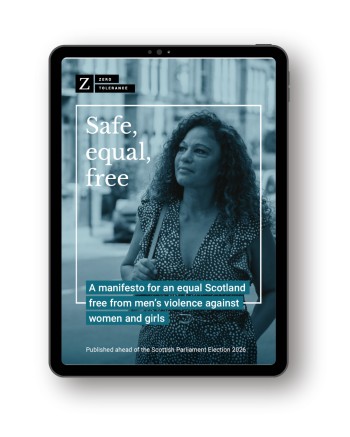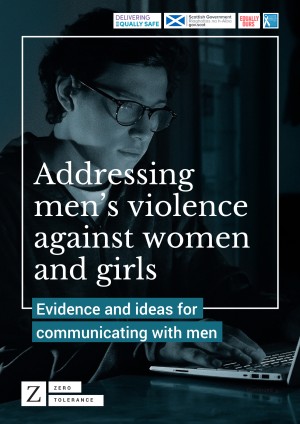News and events
Our response to the Scottish Government’s consultation on adding the characteristic of Sex into hate crime legislation
We are disappointed with the proposal to add sex as a characteristic to existing hate crime legislation.
The Scottish Government committed to implementing the recommendations of the Independent Working Group on Misogyny, published in ‘Misogyny: A Human Rights Issue’, for a standalone Misogyny Bill. Adding the characteristic of Sex into hate crime legislation is an ineffective response to rising misogyny and fails to protect and ensure the rights of women and girls.
Reasons for a standalone Misogyny Bill
- A Misogyny Bill better protects women as a majority group, as opposed to hate crime legislation, which is designed to protect minorities
- A Misogyny Bill better recognises the complexity and nuance of misogyny, which is not only portrayed by acts of hate but also of prejudice and inequality
- A Misogyny Bill will better protect the rights of trans women who experience misogyny and transphobia at the same time
- A Misogyny Bill recognises that the issue of misogyny is not gender neutral - women experience misogyny because we are women. The approach outlined by the government does not recognise this.
Misogyny is on the rise in Scotland.
We call on the Scottish Government to heed the evidence which has been laid out by equalities organisations since 2018, and bring a Misogyny Bill to Parliament.
Call for a safe and equal Scotland
We all want an equal Scotland free of men’s violence against women and girls.
The next Scottish Parliament election is a chance to set Scotland’s focus for the next five years. It’s vital that ending men’s violence against women and girls must be at the heart of it.
In the run up to May’s election, political parties will use their manifestos to tell us what they care about and what actions they’ll commit to if elected.
These commitments will shape the policies, budgets, and services the new parliament will put in place - aka they will impact waiting times for hospital appointments, running of public transport, how we take care of our local community...
and what action is being taken to end men’s violence against women and girls.
If preventing men’s violence against women and girls isn’t in their manifestos, it won’t be on their agenda.
That’s why we’ve launched our manifesto - to show every party that ending men’s violence against women and girls must be a national priority.
By investing in prevention, we can build a safer, fairer Scotland for everyone.
You can help make sure this happens!
- Share our manifesto with your MSP or candidate and ask them to back prevention. The more voices they hear, the harder it is to ignore.
- Share our manifesto on socials
- Let people know you’ve emailed our manifesto to your MSP, and told them that ending men’s violence against women and girls is important to you
Together, we can make prevention a political priority.
Together, we can end men’s violence against women and girls.
New prevention tool: Evidence and ideas for communicating to encourage men to get involved in preventing men’s violence against women and girls
We want a Scotland free from men’s violence against women and girls.
This is achievable and we have solutions!
Key to success is tackling the root cause of the issue – gender inequality.
It’s an ambitious goal, but across Scotland people are dedicating time and energy to achieving this in many different ways, such as:
-
working for equal representation in our government and parliament
-
reducing the gender pay gap
-
encouraging more girls to choose science, technology, engineering, and mathematic subjects at school and enter STEM careers
But so often, when we talk about gender equality and ending men’s violence against women and girls, we’re preaching to the choir. These issues are often framed as ‘women’s issues’ and women’s responsibility.
Men tune out. Either feeling the conversation isn’t relevant to them or that it isn’t their place to join in.
Improving things requires widespread culture, attitude, and behaviour change throughout Scotland – including men and boys.
So the questions is...
How do we encourage men to get involved in preventing men’s violence against women and girls?
Our search for an answer led us to partnering with White Ribbon Scotland and working with Equally Ours.
‘Addressing men’s violence against women and girls: evidence and ideas for communicating with men’ summarises our foundational research on this topic. It gives evidence on how best to talk to Scottish men aged 16 – 45 who believe in gender equality but don’t often think about or take action on it.
We successfully developed messaging that leads these men to better understand:
-
the link between gender inequality and men’s violence against women and girls
-
that gender equality benefits everyone –and support it
-
their role in men’s ending violence against women and girls
This work will be most useful for those doing community prevention work, running campaigns that include men as an audience, and working with men on masculinity.
The aims of this project are ambitious. Achieving wide scale narrative change takes time and repetition.
We will be publishing a toolkit to support actioning these findings – sign up to our new newsletter, and be the first to receive a copy!
Write to End Violence Against Women Awards 2024 Awards
 The 12th annual Write to End Violence Against Women (WEVAW) Awards, jointly presented by End Violence Against Women Coalition (EVAW) and Zero Tolerance celebrated responsible, accurate, and compassionate journalism that advances understanding and action on violence against women and girls
The 12th annual Write to End Violence Against Women (WEVAW) Awards, jointly presented by End Violence Against Women Coalition (EVAW) and Zero Tolerance celebrated responsible, accurate, and compassionate journalism that advances understanding and action on violence against women and girls
Rachel Adamson, co-director of Zero Tolerance, and Andrea Simon, Director of EVAW, co-hosted the Awards. Opening the ceremony, Rachel highlighted the pressing reality of violence against women and girls, whilst Andrea showcased EVAW’s extensive network of 163 frontline services, activists, survivors, researchers, and NGOs working to end this violence. Together, they emphasised the media’s vital role in challenging the cultural attitudes that normalise violence against women.
Sky News’ lead politics presenter Sophy Ridge delivered a powerful keynote speech highlighting the media’s important role in tackling violence against women and girls. She outlined three key responsibilities for journalists: holding the government to account for its commitments to reduce violence, supporting specific campaigns to improve the justice process, and helping reshape cultural attitudes. Sophy emphasised that media coverage must actively combat victim-blaming whilst fostering a culture where women are believed and all survivors’ stories are treated with equal respect.
Best News Winner
Shehnaz Khan, BBC News, Forced marriage cases will stay ‘underground’ after law change
Judge Rosemary Douce, Head of Standards and Regulation at IPSO, awarded the best News Piece award to Shahnaz Khan to her article focussed on the harms of forced marriage despite changes in law. Rosemary highlighted the new perspective brought by the article, the prominence given to the voices of survivors, and the use of statistics to put the story in context.
Shehnaz accepted the award, describing it as an ‘honour’ and thanking the women she spoke to for trusting her to tell their stories. “It means a lot to me to be able to share stories that I really care about from underrepresented communities that aren’t often heard.”
Best Feature Winner
Amandas Ong, Jacobin, Britain’s Asylum Process Endangers Sexual Violence Survivors
Lexie Kirkconnell-Kawana, CEO of Impress, presented this award to Amandas for centring the women she spoke to with empathy and bringing solace to people with similar trauma of navigating hostile bureaucracy in Britain. She spoke of how the piece stood out against a media climate that’s largely hostile to immigrants and refugees. It was an educating and informing piece that provided context, held authorities and policies to account, and offered solutions.
Amandas was ‘humbled’ to accept the award. She explained that she wished to highlight the culture of scepticism and lack of understanding that permeates healthcare and bureaucracy in the UK after one of the women shared how she’d stayed silent about her experiences of violence as she did not expect to be believed. Amandas expressed her gratitude to the women for sharing their story with her, “this story is really for them”. She finished with reflecting, “The way we work as journalists is so incredibly important, how do we work with care, how do we cast survivors of sexual violence as whole and complex human beings, and work with them rather than relying on tropes of victimhood to tell a story?”
Best Opinion & Comment Winner
Mireille Harper, Glamour UK, Why does Cassie’s trauma need to be seen to be believed?
Awards judge Dr Natasha Hirst, President of the National Union of Journalists, said she had an uplifting experience judging the awards. She awarded Best Opinion and Comment to Mireille Harper for an excellent piece addressing an under explored area of men’s violence against women. The article brought in survivors experiences along with expert opinion and highlighted inequalities that disproportionately affect black women.
Mireille thanked Glamour for platforming the piece and supporting her advocacy. She dedicated the award to Sistah Space and Casandra Centre, two organisations doing brilliant work in the space of violence against black women, and her mother who spent years working in domestic abuse services. ‘It’s equally celebratory and heartbreaking to win this award, especially at a time where it feels like violence against women isn’t just rife but also lauded…I also fear the age we are in is one where the currency of violence reigns and where women of colour globally are paying the price. Unfortunately misogynoir remains on the rise.”
Best Investigation Winner
Hannah Summers, The Bureau of Investigative Journalism, Family Court Files Series
Andrea Simon, of EVAW, presented the Best Investigation award to Hannah Price for exposing systemic failings in the family court systems handling of violence against women. She said the ‘meticulous’ reporting combined rigorous investigation with ethical journalism. The investigation achieved a landmark ruling allowing the naming of a perpetrator who is not a public figure in family court proceedings creating better transparency in the system. It prompted an internal review of the Children and Family Court Advisory Support Service regarding their assessment procedures, prompted discussions at the Ministry of Justice about legislative change on parental rights, and it provided a template of how family court cases involving sexual violence can report responsibly.
Hannah accepted the award and spoke of her initial hesitance to apply to name Kristoffer White but the mother’s support drove her forward. Hannah recognised the mother’s resilience going through the court process, appeal, and her rapist being named in the press. Hannah said, “I was really pleased to be able to interview the mother in this case and to give her a voice.”
Expert’s Pick: Best Broadcast Winner
Anna Hall, Candour TV, The Push
Rachel Adamson, Co-Director of Zero Tolerances, presented the Best Broadcast award to Anna Halll for The Push, for challenging assumptions around who is affected by domestic abuse and tells a story with cultural understanding and care.
Anna Hall could not attend the event but shared the following message recognising the award. “The Push has now been recognised all over the world and we are so grateful to the bravery of the Javed family in their determination to tell the story of what happened to Fawziyah. Fawziyah was a remarkable woman who documented her abuse during her marriage and her evidence led to her husband’s conviction at her own murder trial. Fawziyah’s story shows us that domestic abuse can happen to anyone – a privately educated lawyer from Leeds. And her family wanted Fawziyah’s story to be told to give others the courage to leave their abusive relationships. Thank you so much to the Judges for the recognition of this work – we are extremely grateful.”
Natasha Rattu, from Karma Nirvana, a specialist charity for victims and survivors of honour-based abuse in the UK which supported the making of the documentary, spoke of how The Push has increased recognition and understanding of domestic and honour-based abuse. Natasha highlighted that every time we tell these stories with respect, we honour the lives of the women who’ve been lost.
Wooden Spoon
Invisible perpetrators
Our annual ‘Wooden Spoon’ anti-award, which exposes harmful media practices in reporting violence against women and girls, has named “the invisibilisation of perpetrators” as the most concerning trend of 2024.
In her keynote address, Juliana da Penha, founding editor of Migrant Women Press, described how mainstream media routinely employs passive language that removes perpetrator accountability. She demonstrated how this practice normalises male violence as inevitable, shifts responsibility from perpetrators to victims, and critically, prevents us from addressing the root causes of this violence.
Congratulations to all the award winners and shortlisted journalists. The media has the power to shape people’s attitudes and understanding of men’s violence against women, support survivors, and hold perpetrators to account. Thank you to everyone who contributed to The Write Violence Against Women Awards 2024, including our steering group. And thank you to all the journalists who write about men’s violence against women with care and compassion.
This international men’s day let’s talk about how the manosphere harms boys
As Scotland’s experts on preventing men’s violence against women and girls, Zero Tolerance is highlighting the harm the manosphere is having on boys, and the solution.
This International Men’s Day new research gives insight into young men’s understandings and interactions with extreme misogynistic online content.
Theatre company Civic Digits led a participatory project with young people exploring their experiences of incel culture, the misogynistic online community of men who hate women for making them ‘involuntarily celibate’.
During the project young people attended workshops to explore gender, gender-based violence, critique online content, and create characters vulnerable to radicalisation and grooming. This work ultimately informed the creation of an interactive play, ‘Many Good Men’ which was performed by professional actors.
We commissioned research alongside this project which highlights the harm such content has on boys’ mental health and relationships.
The findings echo other research which shows that online misogynistic content creators target young men, and reinforce harmful gender stereotypes that pressure them to conform to a restrictive definition of masculinity which emphasises money, muscles, and sexual attraction.
Young men who are worried about rejection might innocently search online for advice about how to get a girlfriend. This quickly evolves into a stream of content that gets more and more extreme, morphing boys into young men with low self-esteem, poor relationships, and a hatred of women.
We may feel a desire to directly contradict and criticise this misogynistic content, but the project found this to be ineffective. Instead, the solution lies in creating a non-judgemental environment for young men to discuss and reflect on masculinity, relationships, and sex. These topics then can be more effectively explored through creative activities.
“Most of us agree that equality between boys and girls is a good thing and want all children to live freely and feel safe. But girls are experiencing violence in schools and boys’ attitudes are becoming more misogynistic as they’re targeted by manosphere content online. This content harms young men’s relationships and mental health, as well as encouraging them to engage in violence against women and girls.
The Many Good Men project shows how important it is for boys to have a safe and supportive space to critically engage and challenge such content, as well as expectations of gender, romantic relationships, and masculinity. ” – Rachel Adamson, Zero Tolerance Co-director
“We were delighted to work with Zero Tolerance on this report. It added a huge value to our Many Good Men project as it allowed us to reflect and share the many discoveries we made in this forum theatre approach to addressing the radicalisation of masculinity online. We hope that those important discoveries will now be shared widely and that this will impact the implementation of polices around violence against women and children. Many Good Men demonstrated how impactful a forum theatre approach is for addressing online misogynistic content, particularly as it creates a safe and brave space for communities to come together, to listen to and support young people who experience the consequences of violent and hate filled online content.” – Clare Duffy, Civic Digits Director
To curb the threat of online radical misogyny, we must tackle the root cause: gender inequality. Zero Tolerance is calling on the Scottish Government to:
1.Make it compulsory and statutory to provide comprehensive, gender-equal, culturally sensitive informationin relationships, sexual health and parenthood education (RSHP), so that young people do not have to resort to searching for information online.
2.Strengthen ties between the youth work and education sectors, so that every young person in Scotland has a youth worker they can talk to and ask for information. Youth workers’ skills in relationship building and creating safe, non-judgemental relationships are vital.
3.Collaborate with UK and international partners to regulate online platforms, reducing the amount of harmful content and preventing algorithms from promoting it.
To learn more about the impact of extreme misogyny on young people read the new Many Good Men report. Over the course of 16 Days of Activism to End Gender Based Violence we will be releasing a series of podcasts discussing the key implications of this research.
You can learn more about the Many Good Men project on Civic Digits website and watch the short film (3 mins) for the Many Good Men play.
Read the Many Good Men full report,
Just want the highlights? Read the summary,
Super short on time? Get the headlines from our briefing!

 Zero Tolerance IWD22 Press Release
Zero Tolerance IWD22 Press Release